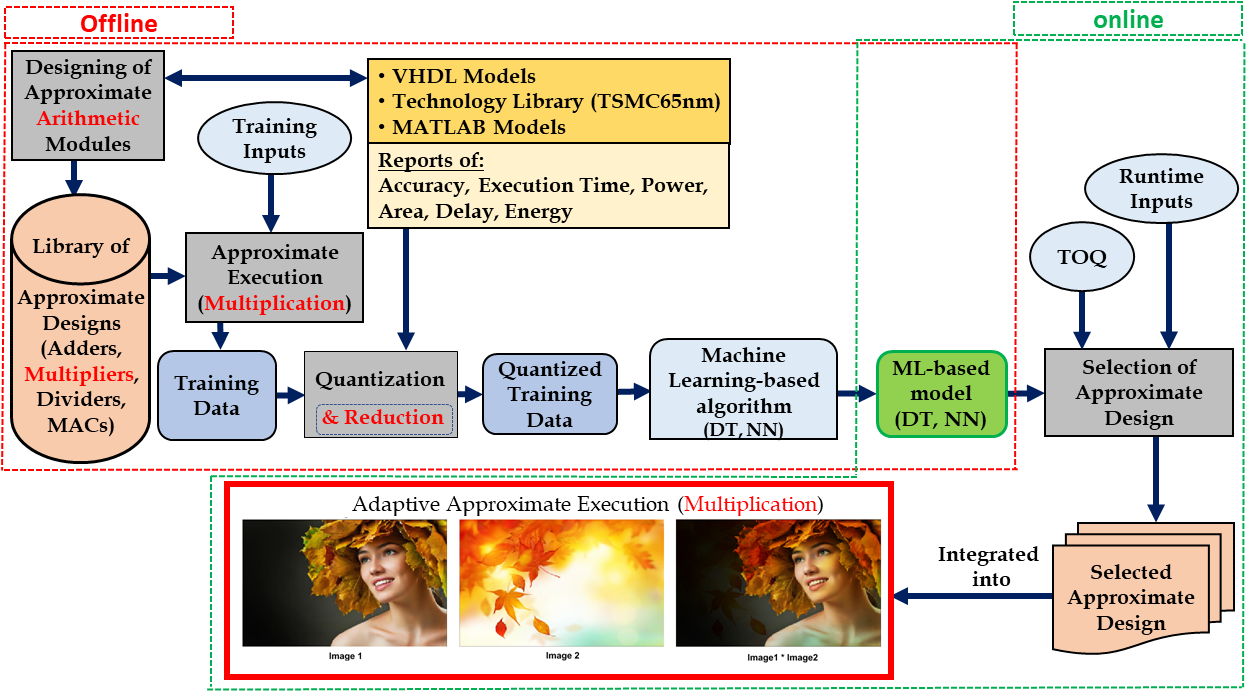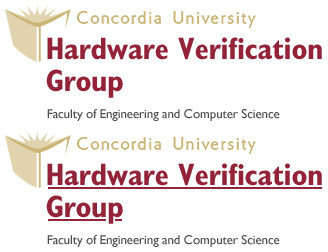Adaptive Approximate Computing for Enhanced Quality Assurance
Mahmoud Masadeh, Osman Hasan and Sofiene Tahar
Contact: mahmoud.masadeh@concordia.ca
Approximate computing has been widely advocated for energy-efficiency in error-tolerant applications to trade-off accuracy for reduced power consumption. However, with a static approximate design, the average target output quality (TOQ) is satisfied, while the quality of individual outputs varies significantly with dynamically changing inputs. Recent approaches are precisely re-evaluating those quality-violating invocations, which significantly diminish the benefits of approximation. In this project, we propose a machine learning-based adaptive approximate design. We design a library of approximate accelerators with 20 different settings, then select the most suitable settings based on the applied inputs and user preferences, without losing the gains of approximations. Therefore, we build an efficient and lightweight machine learning-based design selector to adapt the approximate design to meet a user-defined TOQ. The proposed method applies to any approximate accelerator with error-tolerant components. We fully automate the proposed methodology for both software and hardware implementations. Accuracy analysis for image processing applications showed that it is possible to satisfy the TOQ with an accuracy ranging from 80% to 85.7%.

[2] M. Masadeh, O. Hasan and S. Tahar. Machine Learning-Based Self-Tunable Design of Approximate Computing IEEE Transactions on VLSI, Vol. 29, No. 4, April 2021, pp. 800-813.
[3] M. Masadeh, O. Hasan, and S. Tahar. Input-Conscious Approximate Multiply-Accumulate (MAC) Unit for Energy-Efficieny, IEEE Access, Vol. 7, No. 1, December 2019, pp. 147129-147142.
[2] M. Masadeh, A. Aoun, O. Hasan, S. Tahar. Decision Tree-based Adaptive Approximate Accelerators for Enhanced Quality. International Systems Conference (SysCon) 2020: 1-5.
[3] M. Masadeh, O. Hasan, S. Tahar. Machine Learning-Based Self-Compensating Approximate Computing, International Systems Conference (SysCon) 2020: 1-6.
[4] M. Masadeh, O. Hasan, S. Tahar. Using Machine Learning for Quality Configurable Approximate Computing, Design, Automation Test in Europe (DATE) 2019: 1575-1578.
[5] M. Masadeh, O. Hasan, S. Tahar. Approximation-Conscious IC Testing, International Conference on Microelectronics (ICM) 2018: 56-59.
[6] M. Masadeh, O. Hasan, S. Tahar. Comparative Study of Approximate Multipliers, Great Lakes Symposium on VLSI (GLSVLSI) 2018: 415-418.
[2] M. Masadeh, O. Hasan, S. Tahar. Comparative Study of Approximate Multipliers, Technical Report, Department of Electrical and Computer Engineering, Concordia University, March 2018. [arxiv].

Publications
Thesis
Mahmoud Masadeh, "Adaptive Approximate Computing for Enhanced Quality Assurance", PhD Thesis, Department of Electrical and Computer Engineering, Concordia University, Montreal, Quebec, Canada, August 2020.Journal Papers
[1] M. Masadeh, Y. Elderhalli, O. Hasan and S. Tahar. A Quality-Assured Approximate Hardware Accelerators Based on Machine Learning and Dynamic Partial Reconfiguration, ACM Journal of Emerging Technologies in Computing Systems, Vol. 17, No. 4, October 2021, pp. 57:1-57:19.[2] M. Masadeh, O. Hasan and S. Tahar. Machine Learning-Based Self-Tunable Design of Approximate Computing IEEE Transactions on VLSI, Vol. 29, No. 4, April 2021, pp. 800-813.
[3] M. Masadeh, O. Hasan, and S. Tahar. Input-Conscious Approximate Multiply-Accumulate (MAC) Unit for Energy-Efficieny, IEEE Access, Vol. 7, No. 1, December 2019, pp. 147129-147142.
Conference Papers
[1] M. Masadeh, A. Aoun, O. Hasan and S. Tahar. Highly-Reliable Approximate Quadruple Modular Redundancy with Approximation-Aware Voting, Proc. IEEE International Conference on Microelectronics (ICM), Irbid, Jordan, December 2020, pp. 1-4.[2] M. Masadeh, A. Aoun, O. Hasan, S. Tahar. Decision Tree-based Adaptive Approximate Accelerators for Enhanced Quality. International Systems Conference (SysCon) 2020: 1-5.
[3] M. Masadeh, O. Hasan, S. Tahar. Machine Learning-Based Self-Compensating Approximate Computing, International Systems Conference (SysCon) 2020: 1-6.
[4] M. Masadeh, O. Hasan, S. Tahar. Using Machine Learning for Quality Configurable Approximate Computing, Design, Automation Test in Europe (DATE) 2019: 1575-1578.
[5] M. Masadeh, O. Hasan, S. Tahar. Approximation-Conscious IC Testing, International Conference on Microelectronics (ICM) 2018: 56-59.
[6] M. Masadeh, O. Hasan, S. Tahar. Comparative Study of Approximate Multipliers, Great Lakes Symposium on VLSI (GLSVLSI) 2018: 415-418.
Technical Reports
[1] M. Masadeh, O. Hasan, S. Tahar. Error Analysis of Approximate Array MultipliersTechnical Report, Department of Electrical and Computer Engineering, Concordia University, August 2019. [arxiv].[2] M. Masadeh, O. Hasan, S. Tahar. Comparative Study of Approximate Multipliers, Technical Report, Department of Electrical and Computer Engineering, Concordia University, March 2018. [arxiv].


